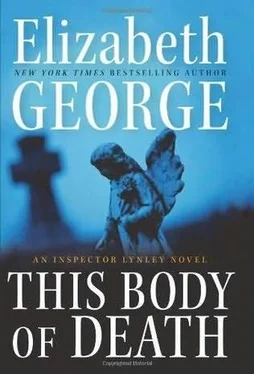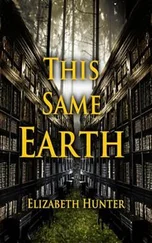She didn’t call his name as she usually did. Instead, she came up the stairs and into the bedroom and she gave a start when she saw him by the window, the sun behind him and the rest of him, he knew, just a silhouette to her. But she made a quick recovery. She said, “Here you are,” and she smiled as if nothing was wrong, and for that single moment how he wanted to believe that she had not given him up to the police.
He said nothing as he tried to gather his wits together. She brushed an errant lock of hair from her cheek. She said his name, and when he didn’t reply, she took a step towards him and said, “Is something wrong, Gordon?”
Something. Everything. Had there been a moment when he’d thought that things could ever be right? And why had he thought that? A woman’s smile, perhaps, the touch of a hand that was soft and smooth against his skin, his hands on the fullness of hips or buttocks, his mouth on the sweetness of breasts…Had he been so much of a fool that the mere act of having a woman somehow could obliterate all that had gone before?
He wondered what Gina knew at this point. The fact that she was here suggested it was little enough, but the fact that she had possibly-probably-found the rail tickets, found the hotel’s receipt, keeping them close to her until she could use them to harm him…And why had he not thrown them away on the platform in Sway upon his return? That was the real question. Had he only thought to do so, he and this woman would not be standing here in this bedroom, in the insufferable summer heat, facing each other with the sin of betrayal in both of their hearts, not only in hers, because he could not claim she was the only sinner.
He hadn’t thrown the tickets away on the station platform and he hadn’t rid himself of the receipt because he hadn’t considered that something might happen to Jemima, that his possession of those bits of paper might damn him, that Gina might find them and keep them and say nothing about his lie to her of having gone to Holland, allowing him to dig himself in deeper and deeper and still not saying a word about what she knew about where he had really been, which was not in Holland, not on a farm talking to someone about reeds, not out of the country at all but rather in the heart of a London cemetery trying to wrest from Jemima’s possession those things she could use to destroy him if she chose.
Gina said, “Gordon, why’re you not answering me? Why’re you looking at me like that?”
“Like what?”
“Like you’re…” She brushed at her hair again, although this time none of it was out of place. Her lips curved but her smile faltered. “Why won’t you answer? Why’re you staring? Is something wrong?”
“I went to talk to her, Gina,” he said. “That’s all I did.”
She furrowed her brow. “Who?”
“I needed to talk to her. She agreed to meet me. I didn’t tell you only because there was no reason to tell you. It was over between us, but she had something of mine that I wanted back.”
She said, the realisation apparently coming to her, “You saw Jemima? When?”
He said, “Don’t pretend you haven’t sussed that. Rob Hastings was here.”
She said, “Gordon, I don’t see how…Rob Hastings?” She gave a small laugh but it held no humour. “You know, you’re actually frightening me. You sound…I don’t know…fierce? Did Rob Hastings say something to you about me? Did he do something? Did you argue with him?”
“He told me about the rail tickets and the hotel receipt.”
“What rail tickets? What hotel receipt?”
“The ones you found. The ones you handed over.”
Her hand rose. She placed the tips of her fingers between her breasts. She said, “Gordon, honestly. You’re…What are you talking about? Did Rob Hastings claim that I gave him something? Something of yours?”
“The cops,” he said.
“What about them?”
“You gave the rail tickets and that hotel receipt to the cops. But if you’d asked me about them instead, I would have told you the truth. I didn’t before this because I didn’t want you to worry. I didn’t want you to think there might still be something between us, because there wasn’t.”
Gina’s eyes-wide, blue, more beautiful than the northern sky-observed him as her head slowly tilted to one side. She said, “What on earth are you talking about? What tickets? What receipts? What did Rob Hastings claim I did?”
He’d claimed nothing, of course. Gordon had merely concluded. And he’d done that because it seemed to him that, unless someone had surreptitiously gone through his rubbish, no one else could have come across those items save Gina. He said, “Rob told me the cops in Lyndhurst have what proves I was in London that day. The day she died.”
“But you weren’t.” Gina’s voice sounded perfectly reasonable. “You were in Holland. You went about the reeds because those from Turkey are becoming rubbish. You didn’t keep the tickets to Holland, so you had to say you were working that day. And Cliff told the police-that man and woman from Scotland Yard-that you were working because you knew they’d think you were lying if you didn’t produce those tickets. And that’s what happened.”
“No. What happened is I went to London. What happened is that I met Jemima in the place she died. On the day she died.”
“Don’t say that!”
“It’s the truth. But when I left her, she was alive. She was sitting on a stone bench at the edge of a clearing where there’s an old chapel and she was alive. I’d not got from her what I wanted to get, but I didn’t hurt her. I came home the next day so you’d think I’d gone to Holland, and I threw those tickets in the rubbish bin. That’s where you found them.”
“No,” she said. “Absolutely not. And if I had found them and been confused by them, I would’ve talked to you. I would’ve asked you why you lied to me. You know that, Gordon.”
“So how do the cops-”
“Rob Hastings told you they have the tickets?” She didn’t wait for an answer. “Then Rob Hastings is lying. He wants you to be blamed. He wants you to…I don’t know…to do something crazy so the police will think…Good heavens, Gordon, he could’ve gone through the rubbish himself, found those tickets, and handed them over to the police. Or he could be holding on to them, just waiting for the moment to use them against you. Or if not him, then someone else with equal dislike for you. But why would I do anything with any tickets other than simply talk to you about them? Have I the slightest reason to do something that might cause you trouble? Look at me. Have I?”
“If you thought that I’d hurt Jemima…”
“Why on earth would I think that? You were through with each other, you and Jemima. You told me that and I believed you.”
“It was true.”
“Then…?”
He said nothing.
She approached him. He could tell she was hesitant, as if he were an anxious animal in need of calming. And she was just as anxious, he could tell. What he couldn’t sense was the source of her anxiety: his paranoia? his accusations? her guilt? the desperation each of them felt to be believed by the other? And why was there desperation at all? He knew for a certainty what he had to lose. But what had she?
She seemed to hear the question, and she said, “So few people have anything good between them. Don’t you see that?”
He didn’t reply, but he felt compelled to look at her, right into her eyes, and the fact of this compulsion made him tear his gaze from her and look anywhere else, which was out of the window. He turned to it. He could see the paddock and the ponies within it.
He said slowly, “You said you were afraid of them. But you went inside. You were in there with them. So you weren’t afraid, were you? Because if you were, you wouldn’t have gone inside for any reason.”
Читать дальше












